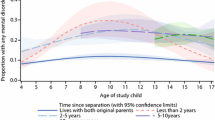Abstract.
Background:
Many studies have described associations between childhood psychiatric disorder and characteristics of the child, and their family, school and neighbourhood, but few studies have studied them simultaneously. Also, most investigators have failed to allow for the extent to which different exposures are correlated, or for clustering at different levels of observation. Our objective was to establish which correlates were independently associated with psychiatric disorder.
Method:
Data on DSM-IV psychiatric diagnoses, as well as child and family characteristics, were obtained on 8772 English 5- to 15-year-olds included in a large British prevalence survey of mental health. These data were supplemented by independent measures of school and neighbourhood disadvantage. We entered child and family variables with the measures of school and neighbourhood disadvantage into a logistic regression analysis to establish which variables were independently associated with child psychiatric disorder.
Results:
No variables were associated with all types of disorder. Poor general health and life events were related to emotional disorders, while conduct disorders were most closely associated with family variables, and ADHD was only related to child characteristics. Disadvantaged schools, deprived neighbourhoods, low socioeconomic status, parental unemployment, cohabiting, large family size, and poverty were not independently associated with disorder.
Conclusions:
Individually assessed child and family factors may be more influential than aggregate measures of school and neighbourhood factors. Different disorders have distinctive correlates. Many of the best known “risk factors” are not independently related to childhood psychiatric disorder, and are, therefore, acting distally in the causal pathway or irrelevant.
Similar content being viewed by others
Author information
Authors and Affiliations
Rights and permissions
About this article
Cite this article
Ford, T., Goodman, R. & Meltzer, H. The relative importance of child, family, school and neighbourhood correlates of childhood psychiatric disorder. Soc Psychiatry Psychiatr Epidemiol 39, 487–496 (2004). https://doi.org/10.1007/s00127-004-0782-0
Accepted:
Issue Date:
DOI: https://doi.org/10.1007/s00127-004-0782-0



